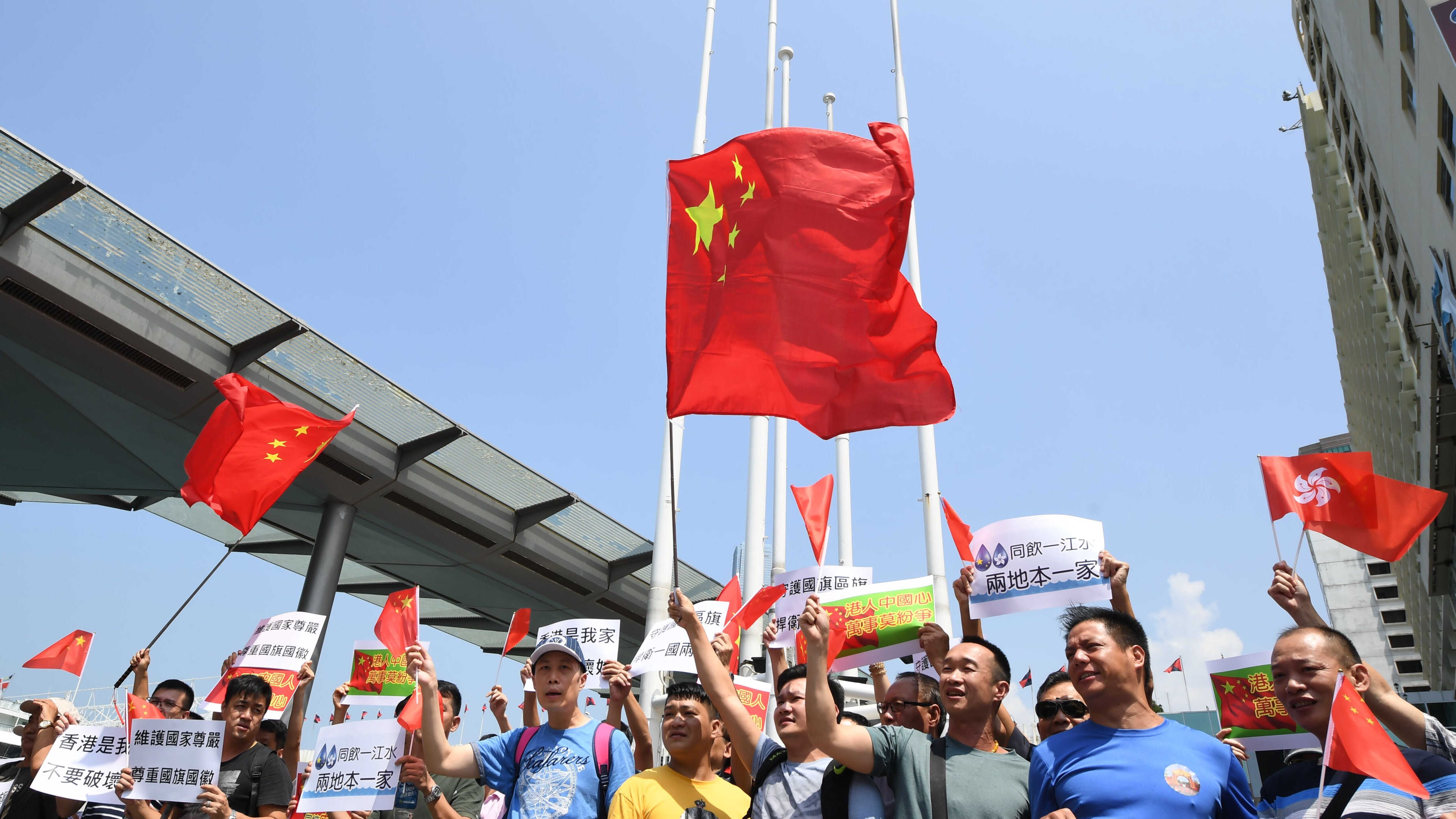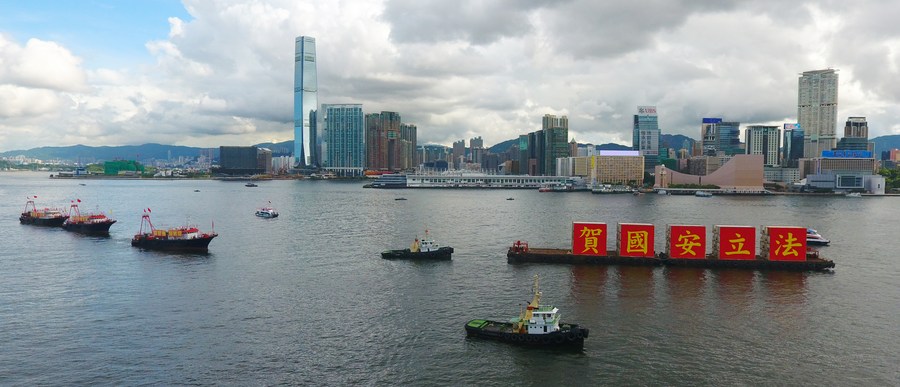
People wave the Chinese national flag and the flag of the Hong Kong Special Administrative Region at a pier in Tsim Sha Tsui of Hong Kong, south China, August 8, 2019. /Xinhua
People wave the Chinese national flag and the flag of the Hong Kong Special Administrative Region at a pier in Tsim Sha Tsui of Hong Kong, south China, August 8, 2019. /Xinhua
Editor's note: Hannan Hussain is a foreign affairs commentator and author. He is a Fulbright recipient at the University of Maryland, U.S. and a former assistant researcher at the Islamabad Policy Research Institute. The article reflects the author's opinions and not necessarily the views of CGTN.
On December 7, the outgoing Trump administration followed through on its reckless offensive against China's National People's Congress, announcing sanctions against 14 senior members of the National People's Congress (NPC) Standing Committee over Hong Kong issues.
Not only are these sanctions a flagrant violation of China's sovereign priorities, but they also speak to Trump administration's deeply politicized anti-China campaigning in its final weeks. Desperate to challenge the legitimacy and consistency of the NPC Standing Committee's Hong Kong-related national security imperative, the Trump administration's latest hit is bound to elicit a single outcome: establish its ironclad resistance to rules-based leadership in sovereign lands.
The financial sanctions are listed as part of the U.S. Department of Treasury's "Specially Designated Nationals List," extending asset freezes and travel bans to targeted members of China's top legislature. But beneath all the provocative strongman posturing lies the strongest disregard for the freedoms and liberties of the people of Hong Kong.
For instance, Pompeo's groundless assertion that China has "repeatedly [used the law] to stifle dissent" in Hong Kong effectively discredits Hong Kong residents' embrace of social order, constitutional safeguards and humanitarian freedom on the back of the same legislation.
Pompeo is also wrong to declare the disqualification of Legislative Council (LegCo) members as some "unrelenting assault" on Hong Kong's ability to choose their elected representatives. His broader recommendation here is for China's central government to allow a convergence of civil servants and foreign collusion in the HKSAR – a nexus that the U.S. has leveraged to orchestrate unrest and cultivate opposition to China's constitutional laws, all under the garb of "democratic freedom."
Therefore, by sanctioning officials that stand committed to Hong Kong's stability, Pompeo categorically debunks any so-called service to Hong Kong's "promised autonomy." Instead, these sanctions represent the Trump administration's human rights doublespeak at its zenith.

A ship carrying the slogan "celebrating the passage of the Law of the People's Republic of China on Safeguarding National Security in the Hong Kong Special Administrative Region" sails in Victoria Harbor, Hong Kong, China, July 1, 2020. /Xinhua
A ship carrying the slogan "celebrating the passage of the Law of the People's Republic of China on Safeguarding National Security in the Hong Kong Special Administrative Region" sails in Victoria Harbor, Hong Kong, China, July 1, 2020. /Xinhua
It would also be a mistake to ignore the timing of the Trump administration's latest provocations, given that the domestic climate for anti-China bashing is politically opportune.
Just last month, Trump's top aides indicated the president's "consideration" for more hardline actions against China, including sanctions against CPC officials.
Note that despite these anti-China escalations being deprived of the slightest sense of evidence, sovereign statecraft and future consequence, officials still expect them to qualify as "historic" for the outgoing administration.
On the intelligence front, long-time Trump loyalist and Director of the U.S. National Intelligence John Ratcliffe helped set the stage for Pompeo's December 7 announcement. Days prior, Ratcliffe delivered on his anticipated push for great power competition with an "adversarial China," unleashing a streak of vindictive broadsides against senior CPC leadership in a prearranged mainstream media feature. Taken together, toxic accusations of "ideological control" and self-identified anti-freedom pivots cut across all fronts.
It is with this understanding that the Chinese government's foresight reflects in its accurate, measured and highly perceptive take on the provocations well in advance.
During a press briefing on December 7, the Chinese Foreign Ministry spokesperson made clear that even if the reported sanctions were to be formally announced, China's position on the matter stands well-established. Select members of the NPC's Standing Committee echoed this understanding, taking the cover off Pompeo's groundless allegations.
In truth, it is the Trump administration's distorted narrative on Hong Kong issues that has taken a beating in recent weeks. HKSAR Chief Executive Carrie Lam, unfazed by U.S. sanctions, is stating that the NPC Standing Committee's decision on LegCo members was in accordance with the law, underlining the "prerequisite to continue to operate in the LegCo."
The outgoing U.S. administration quickly moved goalposts, repackaging its condemnation of China's internal security imperatives as part of the so-called "Five Eyes" alliance. The most recent sanctions against senior Chinese officials suggest that the Five Eyes alliance stunt was short-lived and that the U.S. administration continues to appear high on freedom fiction and exceedingly short on a principled perspective on national sovereignty.
It is against this very sovereignty benchmark that targeting Chinese officials won't yield any leeway for foreign interference. It would only expose the Trump administration's facade of "democratic autonomy," as well as the hollow patterns of sovereign transgression that continue to come with it.
(If you want to contribute and have specific expertise, please contact us at opinions@cgtn.com.)

